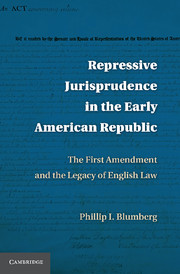 Repressive Jurisprudence in the Early American Republic
Repressive Jurisprudence in the Early American Republic Book contents
- Frontmatter
- Contents
- Acknowledgments
- 1 Political and Jurisprudential Worlds in Conflict in the New Republic
- 2 Politics in the New Republic
- 3 Criminal Libel in the Colonies, the States, and the Early Republic During the Washington Administration
- 4 Federalist Partisan Use of Criminal and Seditious Libel – Statutory and Common Law – During the Tumultuous Adams Administration
- 5 Criminal Libel During the Jefferson and Madison Administrations, 1800–1816
- 6 Partisan Prosecutions for Criminal Libel in the State Courts: Federalists Against Republicans, Republicans Against Federalists, and Republicans Against Dissident Republicans in Struggles for Party Control
- 7 Established Jurisprudential Doctrines (Other than Criminal Libel) Available in the New Republic for Suppression of Anti-Establishment Speech
- 8 Still Other 19th-Century Doctrines for Suppression of Anti-Establishment Speech: The Law of Blasphemy and the Slave State Anti-Abolition Statutes
- 9 Conclusion
- Table of Cases
- Index
8 - Still Other 19th-Century Doctrines for Suppression of Anti-Establishment Speech: The Law of Blasphemy and the Slave State Anti-Abolition Statutes
Published online by Cambridge University Press: 05 October 2010
- Frontmatter
- Contents
- Acknowledgments
- 1 Political and Jurisprudential Worlds in Conflict in the New Republic
- 2 Politics in the New Republic
- 3 Criminal Libel in the Colonies, the States, and the Early Republic During the Washington Administration
- 4 Federalist Partisan Use of Criminal and Seditious Libel – Statutory and Common Law – During the Tumultuous Adams Administration
- 5 Criminal Libel During the Jefferson and Madison Administrations, 1800–1816
- 6 Partisan Prosecutions for Criminal Libel in the State Courts: Federalists Against Republicans, Republicans Against Federalists, and Republicans Against Dissident Republicans in Struggles for Party Control
- 7 Established Jurisprudential Doctrines (Other than Criminal Libel) Available in the New Republic for Suppression of Anti-Establishment Speech
- 8 Still Other 19th-Century Doctrines for Suppression of Anti-Establishment Speech: The Law of Blasphemy and the Slave State Anti-Abolition Statutes
- 9 Conclusion
- Table of Cases
- Index
Summary
Introduction
As the 18th century gave way to the 19th, the widespread criminalization of anti-establishment speech cast a wide shadow on the jurisprudence of the times. The Sedition Act of 1798 and the even more draconic common-law doctrine of criminal libel, which serve as the primary focus of this volume, provide a vivid insight into this unhappy period in American jurisprudence. However, to understand how the American society of the time including so many of the Founding Fathers – veterans of the Revolutionary War or the Constitutional Convention – approved of such criminalization and its use, party against party in the political struggles of the period, one should go further. It is essential to understand that criminal libel did not stand alone. It was only one, certainly the most important but only one, of a half dozen doctrines available in the jurisprudence of the times for suppression of anti-establishment speech.
Chapters 7 and 8 seek to place the experience with criminal libel in its larger jurisprudential context by considering these other doctrines that also served to suppress what may be characterized as anti-establishment speech. Chapter 7 examined the various other repressive doctrines employed by Federalists and Republicans alike when they were in power to suppress dissenting political points of view. These included contempt of court and contempt of the legislature for out-of-chamber criticism of the judiciary and legislature, pre-trial binding over for good behavior in criminal libel cases, and breach of peace.
- Type
- Chapter
- Information
- Repressive Jurisprudence in the Early American RepublicThe First Amendment and the Legacy of English Law, pp. 318 - 373Publisher: Cambridge University PressPrint publication year: 2010


